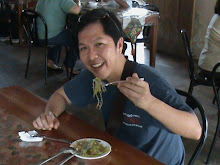
Kaibigan,
Take this trip with me to Linay, Manukan, Zamboanga del Norte. After 37 years, I was going home again to where my family began to bury my Nanang. I was around 11 years old the last time I was in this dusty, sleepy town. Why I ended up in Manila living with my Tiang Caring is a story of telenovela proportions. Permit me to begin from the beginning.
In the 1950’s, just right about the time when the Hukbalahaps were being wooed by President Magsaysay with incentives and benefits to come back to the nation’s fold instead of staying in the hills to fight the government, my Tatang was awarded a land grant of a few hectares in Zamboaga. So, with my Nanang, off they went from one of the farthest towns in Ilocos, north of Manila, to this little town way down south where there was promise of copra. I imagine my parents taking the 12-hour bus trip to Manila and then taking another long trip, this time by a rusty, slow boat from Pier 14, with all of their belongings, which were not much considering that they just got married. Nanang, with her sad eyes and intelligent forehead, was a new graduate from the Philippine Normal College. Tatang was a handsome, young man who, prior to getting married at 24, was endlessly being doted on by his elder sisters.
I would like to imagine a romantic ocean voyage for this young couple whose lives were just starting then. Alas, I know well enough from stories picked up as a child (when adults think that children are not listening) that my Tatang, troubled in his youth, was not yet the good husband that he was to become. And besides, honeymoon cruises were not yet then in vogue for local ship travel. There were no private suites available where a young couple could retire and cuddle after a moon-lit walk on the deck. In the 1950’s, all ship passengers slept on identical iron double deck cots soldered to the floor. The only thing that differentiated the first class from the third is the deck where the cots were located and the number of viands available for them to eat.
If I were to write this voyage scene based on how I know my parents, I would let my Nanang take care of looking after their luggage while my Tatang striding beside her, puffing his endless smokes, is starting to complain and become difficult because of the jostle of the crowd and the balmy April heat. At night, after dinner, my parents would take in the breeze. They would talk about the frontier they were about to cross, gazing towards the dark horizon, holding hands like little children playing fearless in the dark. Deep into the night, as the air turned chillier, I can hear Tatang offer to get Nanang a jacket. And later still, my Tatang, holding Nanang close to him, might have had that naughty look in his eye. Alone in the dark with the girl she loved and a marriage license neatly folded and stuck in his wallet, he had no excuse to rein in the raging hormones of his youth. At this point, I will permit them to kiss, of course. He could even sing to her—this after all, was the 1950’s. Then I would cut to the waves slapping the ship. And you and I would know that the evening was spent happily.
In Dipolog, my parents had to take a two-hour dusty and bumpy jeepney ride to Linay. On my last trip to the place, the scene along the road had not changed much. The view unfurls an endless ribbon of tall coconuts, verdant mahogany, wide and shady mango trees, rice fields in emerald green to jade. In my parents time, one passed by several wood bridges over wide rivers that emptied into the nearby sea. The wood bridges creaked from the weight of jeepneys filled to the brim with people, farm animals and produce. Except for the asphalt road and the concrete bridges, nothing much has changed. To my mind, the road to Linay looked this way. And still does.
In the 1950’s, just right about the time when the Hukbalahaps were being wooed by President Magsaysay with incentives and benefits to come back to the nation’s fold instead of staying in the hills to fight the government, my Tatang was awarded a land grant of a few hectares in Zamboaga. So, with my Nanang, off they went from one of the farthest towns in Ilocos, north of Manila, to this little town way down south where there was promise of copra. I imagine my parents taking the 12-hour bus trip to Manila and then taking another long trip, this time by a rusty, slow boat from Pier 14, with all of their belongings, which were not much considering that they just got married. Nanang, with her sad eyes and intelligent forehead, was a new graduate from the Philippine Normal College. Tatang was a handsome, young man who, prior to getting married at 24, was endlessly being doted on by his elder sisters.
I would like to imagine a romantic ocean voyage for this young couple whose lives were just starting then. Alas, I know well enough from stories picked up as a child (when adults think that children are not listening) that my Tatang, troubled in his youth, was not yet the good husband that he was to become. And besides, honeymoon cruises were not yet then in vogue for local ship travel. There were no private suites available where a young couple could retire and cuddle after a moon-lit walk on the deck. In the 1950’s, all ship passengers slept on identical iron double deck cots soldered to the floor. The only thing that differentiated the first class from the third is the deck where the cots were located and the number of viands available for them to eat.
If I were to write this voyage scene based on how I know my parents, I would let my Nanang take care of looking after their luggage while my Tatang striding beside her, puffing his endless smokes, is starting to complain and become difficult because of the jostle of the crowd and the balmy April heat. At night, after dinner, my parents would take in the breeze. They would talk about the frontier they were about to cross, gazing towards the dark horizon, holding hands like little children playing fearless in the dark. Deep into the night, as the air turned chillier, I can hear Tatang offer to get Nanang a jacket. And later still, my Tatang, holding Nanang close to him, might have had that naughty look in his eye. Alone in the dark with the girl she loved and a marriage license neatly folded and stuck in his wallet, he had no excuse to rein in the raging hormones of his youth. At this point, I will permit them to kiss, of course. He could even sing to her—this after all, was the 1950’s. Then I would cut to the waves slapping the ship. And you and I would know that the evening was spent happily.
In Dipolog, my parents had to take a two-hour dusty and bumpy jeepney ride to Linay. On my last trip to the place, the scene along the road had not changed much. The view unfurls an endless ribbon of tall coconuts, verdant mahogany, wide and shady mango trees, rice fields in emerald green to jade. In my parents time, one passed by several wood bridges over wide rivers that emptied into the nearby sea. The wood bridges creaked from the weight of jeepneys filled to the brim with people, farm animals and produce. Except for the asphalt road and the concrete bridges, nothing much has changed. To my mind, the road to Linay looked this way. And still does.
My Tatang didn’t carry my Nanang over the threshold of their new home, not only because he wasn’t the sort to, but mainly because there was no house. They had to sleep with a neighbor while a house was being built. Water had to be taken from a well near the school. The place had not heard of indoor plumbing. There was no electricity. The land had not yet been planted with coconut trees from which the copra was to be made. Most of all, the people of Linay did not speak Ilocano. My parents, on the other hand, did not know the dialect. By default, my parents and their new neighbors spoke to each other in English for a few months, just enough time to get my parents started on the local tongue.



2 comments:
what happens next? wow, i really love how you write! how can one be so sophisticated, eloquent and funny all at the same time? i'm hooked! you have a faithful reader in me from now on. :-D
thanks, Faye, for dropping by and coming here every so often. be patient with me and my output. hay! life, writing, a day job-- not the easiest thing to juggle.
be safe always.
Post a Comment